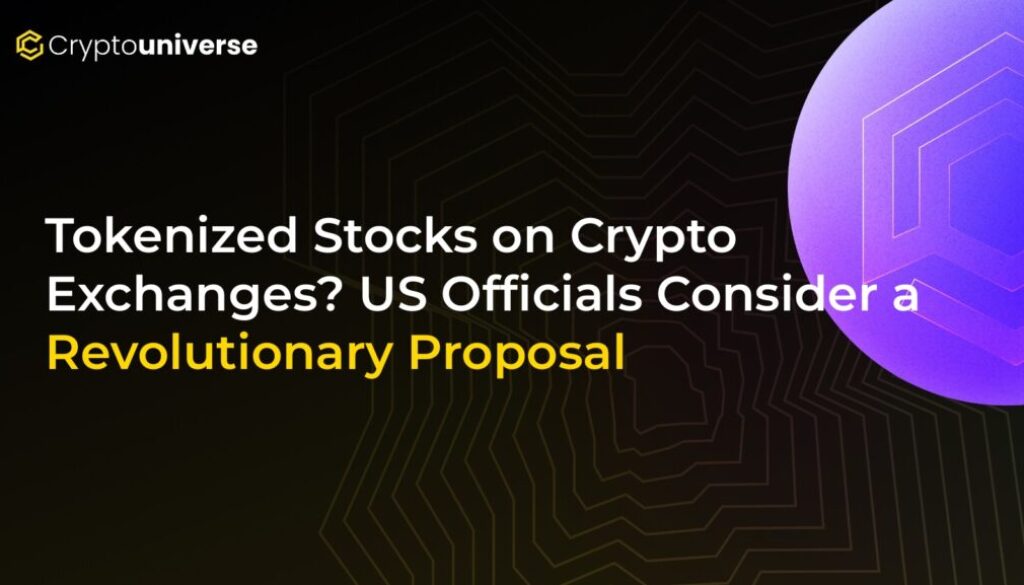Tokenized Stocks on Crypto Exchanges? US Officials Consider a Revolutionary Proposal

The Future of Finance is Knocking: SEC Explores Tokenized Stocks
The line between Wall Street and the world of digital assets is becoming increasingly blurred. In a move that could fundamentally reshape financial markets, U.S. officials are reportedly in early-stage discussions about a groundbreaking proposal: allowing stocks registered on the blockchain, known as tokenized stocks, to be traded on cryptocurrency exchanges. This development signals that the financial world
But what does this actually mean for investors and the market at large? In simple terms, tokenization creates a digital representation of a real-world asset, like a share of a company, on a blockchain. If this proposal moves forward, you could potentially buy and sell digital versions of your favorite stocks on approved crypto platforms, right alongside Bitcoin and Ethereum.
The Race to Bridge Traditional and Digital Markets
The concept isn’t just a distant dream; major players are already positioning themselves for this new reality. The push for tokenized securities is gaining momentum from both crypto-native companies and established financial institutions.
- Coinbase: The leading U.S. crypto exchange is reportedly seeking the SEC’s green light to offer tokenized equities to its users.
- Nasdaq: The iconic stock exchange has formally requested a rule change that would permit it to list tokenized securities, showing that even legacy institutions see the immense potential.
- Kraken and Robinhood: These popular trading platforms have already taken steps to offer tokenized stocks, signaling strong market demand for these hybrid products.
A Trillion-Dollar Opportunity at a ‘Major Inflection Point’
The scale of this potential market is staggering. According to research from Binance, the tokenized asset market, which currently stands at approximately $31 billion, could explode to over $1.3 trillion if just 1% of global equities were moved onto the blockchain. This rapid growth has led many analysts to believe that tokenization is approaching a critical turning point in the evolution toward a system of “hybrid finance”—a seamless blend of traditional financial (TradFi) infrastructure and decentralized finance (DeFi) technology.
The benefits are clear: tokenization could unlock 24/7 trading, enable fractional ownership for smaller investors, and provide faster, more efficient settlement of trades across a global market.
Not Everyone is on Board: The Pushback from Wall Street
Despite the excitement, the proposal faces significant skepticism from some corners of the traditional finance world. In a note to the SEC, financial giant Citadel Securities voiced concerns, cautioning that this innovation must deliver real value and not simply exploit regulatory loopholes. Their statement reads: “Tokenized securities must achieve success by delivering real innovation and efficiency to market participants, rather than through self-serving regulatory arbitrage.”
This highlights the central tension in this debate: ensuring that the integration of blockchain technology into capital markets is driven by genuine technological advancement and not by a desire to bypass established investor protections.
The Environmental Question Looms Large
As with any major development involving blockchain technology, the environmental impact cannot be ignored. A significant increase in blockchain-based trading could lead to higher energy consumption. Cryptocurrency operations are notoriously power-intensive, with some estimates suggesting a single transaction can consume as much electricity as a household uses in several days. This raises valid concerns about increased carbon emissions and strain on electrical grids.
However, the narrative isn’t entirely one-sided. The crypto industry also holds the potential to drive positive environmental change. Blockchain projects can be used to finance and manage renewable energy initiatives, and there is a growing movement to power crypto operations with sustainable energy sources like solar and wind.
The Road Ahead: A New Era for Investing?
The discussions within the SEC are still in their early stages, and the path to fully regulated, exchange-traded tokenized stocks is filled with challenges. Yet, the conversation itself is a powerful indicator of the direction finance is heading. Whether this proposal will revolutionize investing or face insurmountable hurdles remains to be seen. What is certain is that the convergence of blockchain and traditional markets is no longer a matter of ‘if,’ but ‘when’ and ‘how.’ This is a space every investor should be watching closely.


